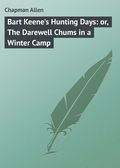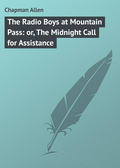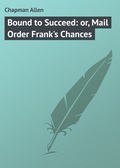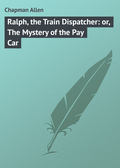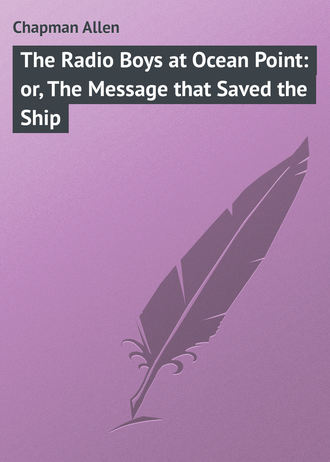
Chapman Allen
The Radio Boys at Ocean Point: or, The Message that Saved the Ship
That help seemed an endless time in coming, but at length the captain’s night glasses caught sight of a point of light upon the waves. It came nearer and nearer until it became evident that a ship was bearing down upon them. A great rocket soared into the air in answer to those sent up by the Horolusa, and in the light from it could be seen the outline of a large steamer that changed its course and swept around until it was parallel with the Horolusa and yet at a sufficient distance to prevent the vessels being driven into each other.
The roar of the storm prevented any call being heard from one captain to the other, but down in the wireless room the operators were busy and a plan of action was agreed upon. By this time the patch of sail had been fastened over the hole in the bow of the Horolusa, and she had ceased to settle in the water. With the sea shut out from the bow, the pumps speedily cleared out the water that was already in the hold of the ship and she was perceptibly rising in the water. If the patch held, the vessel might still be saved, or at least kept afloat until the sea calmed down, when permanent repairs could be made.
As the fate of the Horolusa’s lifeboats had proved that it was impossible for small boats to live in such a sea, it was arranged that theFalcon as the rescuing vessel was named, would stand by until morning or until the storm abated, and then either take the Horolusa’s passengers aboard or try to help the vessel itself into port.
Two hours later the lights of another vessel loomed above the horizon and the steamerEsperanto came hurrying to help. She too offered to stand by and give every assistance in her power.
The relief of the passengers of the Horolusa, who for hours had been gazing into the very eyes of death, were beyond the power of words to express. When Dr. Dale, who had visited the wireless room, came back to report that the S. O. S. message that had brought the two vessels to their aid had been relayed from Ocean Point the wonder of those from Clintonia broke out in exclamations.
“And a curious thing,” the doctor added, “is that the operators feel sure that the call was sent by amateurs. There was something about it – something halting, uncertain – that made them sure it didn’t come from a professional. Perhaps – who knows? – it may have been Bob or Joe whose message saved the ship!”
“If we are really saved,” came with a shudder from Mrs. Layton. “If only the storm were over!”
“And we were safe on land,” added Mrs. Plummer.
She had scarcely spoken when the steamer gave a mighty heave and they heard the rush of water over her bow.
“We’re sinking! We’re sinking!” came a scream from one frightened passenger.
“Not yet,” added another quickly. “But it looks mighty bad.”
CHAPTER XXIII – FROM THE JAWS OF DEATH
It was in a tumult of excitement that the radio boys started out to run down Dan Cassey, who they felt sure was the rascal who had assaulted Brandon Harvey and robbed the safe. They were, too, in a frenzy of apprehension about the fate of their parents and friends out on the stormy sea.
Still they had been relieved to some extent by the assurances that vessels were hastening over the wild wastes of water to the help of the imperiled ship and by the knowledge that all had been done that could be done under the circumstances. It seemed to them that it was now clearly their duty to assist in the running down of a criminal who had made such a dastardly attack upon one of their best friends.
Their task was made the harder by the blackness of the night and the fury of the storm. The gale had risen in violence until it had reached nearly a hundred miles an hour. It buffeted them about, and at times turned them completely around. Fortunately the sand was sodden with rain, otherwise the boys would have been choked and blinded by the flying particles.
But the rain that helped them in this respect hindered them in another, for it drenched their clothes and made them cling close to their skins so that rapid progress was made almost impossible.
“Never mind, fellows,” Bob shouted. “The same things that are bothering us are bothering Cassey too. But there’s no use in our all sticking close together. Let’s spread out like a fan, and if one of us doesn’t come across him, another may. The first fellow that catches sight of him can let out a shout and we’ll all close in. Come ahead now, fellows. Speed’s the word.”
They set out with redoubled determination and made their way the best they could against the fury of the elements. The din created by the roaring of the gale and the thunderous beating of the surf upon the beach was beyond description. It was like the roar of a dozen Niagaras, and fairly deafened the boys as they plowed along with heads down against the storm. And if it was as terrible as this on land, where at least they were safe, what must it be on the howling waste where was tossing at this moment the crippled ship that held their loved ones.
In the mind of each was that same vision – that ship a mere speck on the mighty waters, as helpless as a bird with a broken wing, utterly at the mercy of the giant of the storm.
Yet not utterly, thank God! The wonderful radio had flashed its message through the black night, had reached out over the mighty waves, had gone to one ship and said “Come,” had gone to still another and said “Come,” perhaps to still another and still another, always with the same message “Come! A comrade is in danger. I’ll lead you to him. Come! Come quickly!”
And one gallant ship had heard and answered; and still another had heard and turned its prow in the direction of the sinking vessel, and by this time perhaps others were tearing through the waves toward the helpless craft that the ocean threatened to engulf.
This was the hope that buoyed up the comrades and kept them from despair as they hurried as fast as they could through the Egyptian darkness of the night.
The path that they were following, or rather the direction in which they were going – for in that blackness no path could be seen – was toward the bungalow colony, beyond which lay the town. It was their plan to go straight on to the town, if they were not successful in coming up with Cassey before they got there, and send out a description of the scoundrel to all nearby towns and warn the authorities to be on the alert to apprehend him.
Between the radio station and the bungalow colony was a little inlet into which the sea ebbed and flowed with the movement of the tide. It was from fifty to sixty feet wide, and a bridge stretched across it at a height of twenty feet above the water.
The inlet, or cove, was a comparatively quiet place and was much frequented by the boys, and indeed all the members of the bungalow colony, for fishing and paddling about in rowboats and canoes, craft that would have been too frail for the open sea.
“Must be getting pretty near the bridge, don’t you think, fellows?” asked Bob, after they had got some distance from the radio station.
“Seems so to me,” replied Joe. “Though in this darkness you can hardly see your hand before your face.”
“We’ve got to be mighty careful and watch our step, or one of us will be tumbling in,” said Herb. “And while I’m fond enough of bathing as a rule, I want to go in of my own accord.”
“I guess we’ll have to depend on our ears instead of our eyes to warn us when we’re getting close,” replied Joe. “And from what I think I hear, our ears will be quite sufficient. Listen!”
The boys stood still for a moment, and then they all heard a sibilant, shrill, hissing sound that was entirely distinct from the beating of the surf along the shore.
“That’s something new,” remarked Bob. “We didn’t hear that when we came from the colony a little while ago.”
“No,” replied Joe. “But in the meantime the ocean has been getting in its work and has forced its way into the inlet. From the sound, the water’s rushing through there like a mill race. And it’s all the fiercer because the channel is so narrow. I guess Herb was right when he said we’d have to watch our step.”
“Let’s all keep close together until we’ve got on the other side,” suggested Bob. “It seems to me that I can see the outline of the bridge just a little way ahead.”
By advancing slowly, step at a time, they found their way to the entrance to the bridge and Bob heaved a sigh of relief as his hand rested on the railing.
“Here we are all right,” he said. “Now follow close in Indian file.”
“The inlet has surely gone on a rampage,” Joe remarked. “Just hear the way the water goes tearing along. And from the sound it isn’t so far below the level of the bridge. Don’t let’s dawdle, fellows. I for one will feel a mighty sight better when we get on the other side.”
The others felt the same way, and all quickened their steps. Nor was their apprehension allayed by the way the bridge shook and quivered beneath their feet.
They had nearly reached the middle of the span when an ominous cracking was heard.
“Quick, fellows, quick!” shouted Bob. “The bridge is breaking. Run for your lives!”
He sprang forward like a deer and the others followed him pell-mell. They could feel the bridge giving way beneath them, and the hiss of the water was drowned by the horrid roar of crashing timbers. One last frantic rush and they cleared the bridge and felt the solid ground beneath their feet.
They were not an instant too soon. Even as their feet left the planking there was a splintering crash and the bridge parted in the middle. The ends still clung to the abutments on either side, but the central portions fell into the stream, where they were swung to and fro by the force of the current so violently that it seemed that but a short time would elapse before the ends also would be torn loose from the banks and the whole structure swept down toward the sea.
Cold chills chased each other up and down the boys’ spines as they realized what a narrow escape they had had from being engulfed in those raging waters.
“That was a close call,” panted Bob, as he took out his handkerchief and wiped the perspiration from his face.
“I’ll tell the world it was,” agreed Joe.
“Another five minutes, yes, another five seconds, and we’d have gone down with it,” said Herb. “And I hate to think what it would mean to be fighting for life in that whirlpool.”
“Well, we didn’t go down, thank Heaven,” rejoined Bob. “And a miss is as good as a mile. But where’s Jimmy?” he asked suddenly, as he saw that only two were standing beside him.
“Why, he must be right around here,” replied Joe, peering into the darkness on either side. “I suppose he’s sitting down for a minute to get his breath. Jimmy,” he called.
There was no answer.
An awful fear clutched at the boys’ hearts.
“He’s trying to scare us,” ventured Herb, but without much conviction in his tones.
“Jimmy! Jimmy!” called Bob. “Don’t frighten us, old scout. Where are you?”
Again that dead, terrible silence.
Then, so thin and weak that it sounded as though from a great way off, they heard Jimmy’s voice.
“Help! Help!”
“He’s down in the water,” cried Joe.
“He didn’t get off the bridge in time,” Herb shrieked, in an agony of apprehension.
The three boys rushed to the bank and peered down into the dense darkness where the only light they could discern came from the white spray that crested the waves of the raging torrent.
“Jimmy!” Bob shouted at the top of his voice. “Where are you?”
“I’m down here in the water,” came Jimmy’s voice. “I’m holding on to the broken end of the bridge. But I can’t hold on much longer. Hurry up, fellows, or I’m a goner.”
The boys were frantic with excitement.
“Hold on, Jimmy!” yelled Bob. “Hold on, for the love of Pete! We’ll get you!”
But how?
The broken part of the bridge hung almost perpendicularly for a distance of nearly twenty feet before it reached the water. The rain had made it as slippery as glass. The end on the bank was grinding at its supports and threatened every moment to tear loose and fall into the stream.
All these things Bob took in, in a flash.
“There’s only one way,” he said grimly. “And I’m going to take it. I’m going to work my way down and try to get him.”
“Let me go,” put in Joe, but Bob was off before any one could stop him.
He threw himself down flat on the bridge and began to work his way down backward on his hands and knees. The slope was so steep that it was like going down a ladder, with the difference that with a ladder he would have had rungs on which he could have planted his feet solidly, while here he had to dig his fingers and toes into every crevice he could find to keep himself from sliding down into the abyss of waters. Foot by foot, with infinite care and caution, he let himself down, keeping his eyes shut so that the sight of the madly racing waters beneath him should not make him dizzy and force him to let go his hold.
“I’m coming!” he shouted. “Hold on. I’m coming. I’ll be with you in a minute.”
“I’ll try to, but my arm is getting numb,” answered Jimmy. “Hurt it when I went down, I guess. My fingers are slipping. Hurry.”
A flash of lightning came just then, and Bob, looking over his shoulder, caught a glimpse of Jimmy’s face, usually so ruddy, but now ghastly white. His body was in the water and swung to and fro, while one hand clung desperately to a part of the broken bridge railing from which the waves were trying to wrench him.
“I’m going,” cried Jimmy despairingly. “Oh, Bob, hurry!”
“Hold on,” shouted Bob. “Hold on just one second more!”
He reached his comrade just as Jimmy’s cramped fingers were torn from their support. Like lightning, Bob’s arm shot out and grasped Jimmy’s wrist.
“I’ve got you, old boy,” he shouted. “Just try to keep your head above water and I’ll pull you out.”
With one arm thrown over the railing of the bridge to give him purchase, he pulled Jimmy toward him with all his strength. The current tugged at Jimmy’s body like a ravenous beast unwilling to be balked of its prey. But although the muscles of Bob’s arm felt as though they would break, the indomitable will behind them had its way, and inch by inch he drew Jimmy in until the latter was able to get hold of the swaying planks and lessen in part the strain. Then with infinite care and the utmost exertion of his strength, he half helped, half lifted Jimmy out on the planking, where he lay exhausted and gasping.
CHAPTER XXIV – A TERRIBLE PLIGHT
For a few moments both boys were so used up by the terrific mental and physical strain they had been through that they were unable to move. But the danger was still imminent, and how great it was they learned through a call that came from above.
“Hurry up, fellows,” came from Joe. “The bridge is giving way up here and the whole thing may go down any minute. I’m coming down to help you get Jimmy up.”
“No, don’t do that,” cried Bob, rousing himself to fresh exertions. “Your weight down here would only help to pull the bridge down the quicker. You and Herb stand by to give us a hand when we get near the top.”
“Now, Jimmy,” he continued, turning to his comrade, “we’ve got to brace and get up to the top somehow just as soon as we can. You crawl up alongside of me, grabbing anything you can find to give a hold to your fingers in the cracks of the planking, and I’ll boost you along just as much as I can.”
Jimmy summoned up the last remnants of his strength, and they commenced their arduous climb up the slippery planks of the bridge.
It was like a nightmare. They would advance a little and then slip back, losing sometimes as much as they had gained. But they kept on with an energy born of desperation. As often as Bob found a secure grip with his right hand, he would reach out with his left and give Jimmy a vigorous boost upward and forward. Every second now was precious, for they could tell from the grinding noise above and the increased swaying of the bridge that its last supports were rapidly giving way. Yet despite their utmost endeavor, they were only gaining inches when they should have been gaining feet.
“Buck up, Jimmy,” Bob encouraged his comrade, though his own strength was fast ebbing. “We’ve only got six feet more to go.”
“Not that much,” cried a voice that they recognized as Joe’s, and the next instant a pair of vigorous arms reached out and two strong hands gripped Jimmy’s wrists.
Joe had thrown himself flat, head downward, from the top of the bridge, while Herb at the top held on to his heels.
“Leave Jimmy to me,” commanded Joe.
“We’ll swing him up and then we’ll give you a hand. Pull away, Herb.”
Herb, with his feet braced in two deep holes he had dug in the sand, pulled with all his might until Joe’s knees were over the top, thus giving him a purchase. The next instant they had Jimmy up and lying on his back on the bank.
Bob in the meantime, relieved of his care for Jimmy, had got close to the top. Joe rushed to him, caught one of his arms with his two and pulled him off the bridge just as the last support gave way and the whole structure, with a hideous crash, went down into the boiling torrent.
For a little while not one of the boys could speak. They had been engaged in a fight with death and they had conquered only by the narrowest of margins. They were spent and breathless, but above all they were supremely grateful.
When at last they had recovered somewhat, they turned their attention to Jimmy, who had been the greatest sufferer in the events of that never to be forgotten night.
“How are you feeling now?” asked Bob, as he clapped the stout boy affectionately on the shoulder.
“About as though I had been drawn through a knothole,” replied Jimmy, trying to grin. “I’m as sore as an aching tooth all over, but I guess there are no bones broken. I’m bruised most in my feelings, I reckon. Don’t see any signs of my hair having turned white, do you?” he joked.
“No,” laughed Bob. “Though in this darkness I couldn’t tell whether it was white or black. But you went through enough to turn it white, I’ll vouch for that.”
“Not much more than you went through for me,” replied Jimmy gratefully. “I’ll never forget as long as I live, Bob, how you took your life in your hands to come to my help.”
“Oh, forget it,” returned Bob lightly. “It’s just exactly what any one of you fellows would have done for me if I’d been in the same fix. I tell you, Jimmy, our hearts stood still for a minute when we found you weren’t with us.”
“It all happened so quickly that I don’t know just yet how I came to be hanging on to that bit of railing,” said Jimmy. “I can just remember a fearful crash, and then I went tumbling down with the same feeling at the pit of my stomach that you feel when you drop down fast in an elevator. Then the water closed in over me, and I just reached out wildly and caught hold of something and held on for dear life. I called out two or three times before you heard me. The water was making such a fearful racket that it’s a wonder you heard me at all.”
“We’d have come down as soon as we missed you on a chance of finding you, even if we hadn’t heard you at all,” replied Bob. “But we sure had a close call. That was a dandy idea of Joe’s and Herb’s of forming a human chain. If they hadn’t done it, we would have gone down with the bridge.”
“Well, now that we’re safe and sound, let’s get after Cassey,” suggested Jimmy. “We’re losing time staying here.”
Bob laughed outright, and Joe and Herb joined in.
“You sure have kept your grit, Jimmy, old boy,” said Bob admiringly. “But you’ve done all the chasing after Cassey that you’re going to do to-night. It’s you for the bungalow and bed just as fast as we can get you there. Then the rest of us will keep up the hunt for that rascal.”
Jimmy protested strongly that he was as well as ever, but when he got on his feet he was so weak and trembling from his terrible experience that he could scarcely stand. So he had to give in, and with the other boys supporting him he made his way painfully and slowly to his parents’ bungalow.
Their arrival created a sensation with Mrs. Fennington and the girls, who were deeply concerned when they heard of the strenuous doings of the night. Jimmy was taken in charge at once and put to bed. There was grief and consternation also when they heard of the plight of theHorolusa and her precious freight, but the boys allayed this as much as possible by the reassuring news that other vessels had been signaled and were hurrying to her assistance.
“And now,” said Bob, after they had briefly recounted the news, “we still have a lot of work to do and we must be off. We’re going to head off that Cassey if possible, and then we’re going back to the wireless station. We’ll let you know all that happens just as soon as we can.”
With many adjurations to be careful ringing in their ears, they hurried out. Once again in the open, they hastily laid out the plan of their further campaign.
“Suppose, Herb, you go right on to the police station,” suggested Bob. “Tell them just what has happened and urge them to get busy in sending out messages to surrounding towns and try to have Cassey rounded up. In the meantime, Joe and I will go to the garages and try to find out whether Cassey has been to any of them trying to get a car. That would be the thing he’d most likely do, since there are no trains that he could get away on.”
They all made haste, and in a few minutes reached the town. Herb made a bee line for police headquarters, while Bob and Joe hurried to make inquiries in the three garages of which the town boasted.
At the first two they got no clue. But they were luckier at the third.
“Any one inquiring for a car?” repeated the owner of the garage. “Yes, there was one fellow not fifteen minutes ago. Wanted to get to Allendale, where he said he could catch a train.”
“Did the man stutter?” asked Bob eagerly.
“Should say he did!” replied the garage owner, grinning. “Got so tangled up that he had to whistle to go on.”
“Cassey!” cried the boys in one breath.



